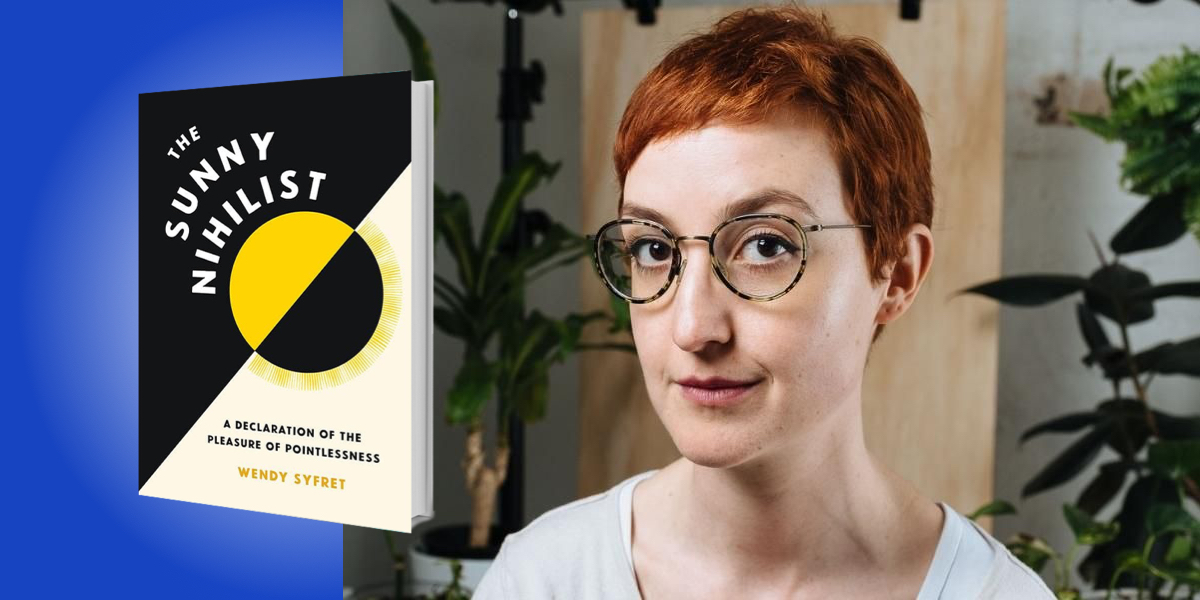Wendy Syfret is a Melbourne-based writer and editor. She is the former Managing Editor of VICE Asia, as well as Head of Editorial for VICE Australia. She has contributed to publications such as The Guardian, Crikey, and ABC Life, to name a few. Currently, she is editor-in-chief of RIISE, a climate-forward fashion and lifestyle publication.
Below, Wendy shares 5 key insights from her new book, The Sunny Nihilist: How a Meaningless Life Can Make You Truly Happy. Listen to the audio version—read by Wendy herself—in the Next Big Idea App.
1. Nihilism doesn’t deserve its bad reputation.
Nihilism has a PR problem—the term itself has become shorthand for “grim” and “depressing.” But I’d argue that this reputation is undeserved, owing more to the people who have embraced, promoted, and manipulated it than the concept itself.
In its simplest form, nihilism preaches that “life is meaningless.” In turn, so are you and I. When we accept that “meaning” isn’t an inherent thing, we can examine it as a concept we create, and hence have the ability to control. Additionally, we can question where it comes from, and who is pushing it.
Even if you don’t go full nihilist, it can be a prompt to wonder: Why do I believe what I believe? Where do these ideas come from? Who is benefitting from them? What do they really deliver to me? And how do they benefit others?
“When we accept that ‘meaning’ isn’t an inherent thing, we can examine it as a concept we create, and hence have the ability to control.”
2. Meaning is supposed to make us happy, but our obsession with it is making us miserable.
The search for a meaningful life isn’t a bad thing. It is a quest that has pushed humanity forward for millennia. It’s also a lot of work—people have dedicated their entire existence to understanding meaning through religion, philosophy, art, and even a commitment to civic life.
Few of us have that kind of time, but our desire for meaningful connection remains. Unfortunately, that lust can easily be hijacked by power-holders who recognize that if they can produce a dupe of that meaningful feeling—for only a fraction of the work needed to create a true sense of meaning—then that’s a powerful tool.
Meaning was never supposed to be binged on. Even believers of meaning located it in, perhaps, one or two parts of their lives. But now, every job is suddenly “culture-defining,” and each consumer product “life-changing.” Nothing can exist without some huge, bloated narrative attached to it. It’s great marketing, but it’s also exhausting.
3. Meaning makes you selfish. Rejecting it might make you kinder.
One of the deceivingly nice things about buying into all this meaning is it can make self-obsession feel like a truly noble act. When we embrace personal myth-making, placing ourselves at the center of the universe, we give ourselves permission to spend a lot of time thinking about our own lives, actions, and experiences. Who doesn’t love that? In contrast, nihilism’s major selling point of “you don’t matter” is a spikier declaration.
“Accepting our own smallness in the face of the universe prompts interesting considerations around how we spend our time, money, and energy.”
Honestly, staring into the abyss takes guts, but there are a lot of benefits to attempting it. Acknowledging nihilist principles doesn’t need to be a destructive experience. Accepting our own smallness in the face of the universe prompts interesting considerations around how we spend our time, money, and energy—when we’re not totally devoted to ourselves.
We start wondering about what we want to last beyond our short lives, and what needs to be protected and treasured. For each person that will be different, but I’d bet it’s not your follower count or LinkedIn presence.
4. Value vs. meaning.
I dunk on meaning a lot, but I’m careful to point out that it’s not the same as value. Value is real, like the practical use of the products we’re bombarded with. We could all benefit from thinking more about value and spending less time wondering about meaning.
At this moment, what do you need to feel happy and well? What is truly being offered for your time and effort? Navigate your life by prioritizing value over meaning, and I promise you’ll feel far more rewarded for your efforts.
“Meaning can manifest as just another box we can never manage to tick.”
5. Meaning takes us out of the moment.
Meaning promises fulfillment, enlightenment, and a path to “living right.” In reality, it too often delivers confusion, and a sense of somehow being in the wrong place at the wrong time. Meaning can manifest as just another box we can never manage to tick.
When we stop thinking about what our lives could be, we return to the reality of what they are. If we accept that existence doesn’t have a reason, then all we have is this life and this precious, fleeting moment. With that perspective, how do we spend our time differently?
For me, each second feels like a rare treat to be enjoyed and savored. Even a mundane day is a gift that will never be repeated. The world feels larger, but also smaller.
I’m able to more clearly ask: What makes me happy? What do I need right now? Where is pleasure really found? The answers are simpler and closer than you think.
A perfect peach, time with loved ones, a midday walk in the sun. These actions are “meaningless,” but they are the tiny blocks that build a beautiful (pointless) life.
To listen to the audio version read by author Wendy Syfret, download the Next Big Idea App today:































